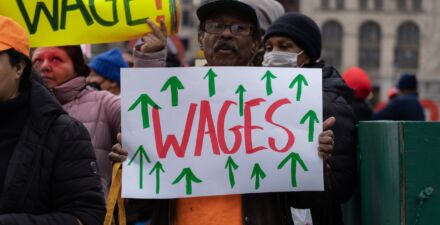Monopsony in the labor market describes employers’ ability to set wages below competitive levels, due to a variety of causes. including increased market concentration and limited job mobility. Equitable Growth digs deep to understand the many causes of monopsony in the U.S. labor market, the extent of monopsony in the labor market today, and what policies can restore balance to competition so workers can earn fair wages.
Featured work
Explore Content in Monopsony133
Request for Proposals: How effective was the fiscal response to the COVID-19 recession for workers?
March 18, 2024
March 18, 2024
Request for proposals: Research grants for early career scholars
November 30, 2023
November 30, 2023
New research finds $15 minimum wages raise pay and increase employment for low-wage workers
October 16, 2023
October 16, 2023
Minimum wage effects and monopsony explanations
October 16, 2023
October 16, 2023
The Role of Regulations in the Development of Labor Market Power: Evidence from Clean Air Act’s New Source Review Permit Program
August 30, 2023
August 30, 2023
Equitable Growth delivers letter responding to the NTIA’s Privacy, Equity, and Civil Rights Request for Comment
March 6, 2023
March 6, 2023
Power and Dignity in the Low-Wage Labor Market: Theory and Evidence from Wal-Mart Workers
December 14, 2022
December 14, 2022
Equitable Growth delivers comment letter responding to the National Labor Relations Board’s Advanced Notice of Proposed Rulemaking on Joint-Employer Standard
December 7, 2022
December 7, 2022
Equitable Growth delivers comment letter responding to FTC’s Advanced Notice of Proposing Rulemaking on Commercial Surveillance and Data Security
November 21, 2022
November 21, 2022
Explore the Equitable Growth network of experts around the country and get answers to today's most pressing questions!










